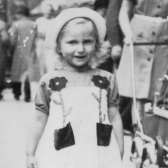
-
Learn More about Josiane
Josie Traum survived the Holocaust as a hidden child in Belgium. She was just three years old when her mother made the agonizing decision to send her away with no information about where she would live or who would take care of her. A group of nuns took in Josie and a few other Jewish children to live with some Christian orphans. When the nuns learned that German officials were looking for the Jewish children, they smuggled them out at night. Josie was placed with a Christian family in Brussels. She rarely stepped out of doors so that her existence remained secret.
Josie Traum was born was Josiane Aizenberg in Brussels, Belgium on March 21, 1939 into a traditional Jewish home to Fanny Aizenberg (Fajga Orenbuch) and Jacques Aizenberg. Jacques worked as a tailor and Fanny was a clothing designer for the Royal House of Belgium. Josie’s father left for England with his brother before the German invasion of Belgium in May 1940 because it was thought that men were likely to be arrested by the Nazis and that women and children would be left alone. He and his brother joined the Polish contingent of the British army where he worked in a factory making uniforms in London.
1942-1945: Josie’s mother took part in the Belgian Resistance movement by hiding refugees in her attic. Through her involvement in the underground resistance movement, Fanny was able to have three-year-old Josie placed in a convent in Brugges in 1942. Fanny and her mother were deported to Auschwitz that same year. Josie was one of three Jewish children among non-Jewish children in the convent. The nuns were strict with all the children. Josie and the other children spent their days saying the rosary and playing in the courtyard. After one year the underground relocated Josie because Nazi suspicion was growing that Jewish children were hidden in the convent. Josie was then placed with a Christian family in Brussels that had a young daughter. The father in this family worked in the resistance and was taken away at times by the Nazis for questioning. Josie’s aunts (Fanny’s two sisters) were also hidden in Belgium by the resistance.
1945-1949: After Belgium was liberated, Josie was found by one of her aunts through connections in the underground. Fanny was hospitalized after being liberated from Auschwitz and did not return to Belgium until late 1945 when she and Josie were reunited. Fanny’s mother was murdered soon after arriving at Auschwitz and Fanny’s father was also murdered after being deported. Josie’s father returned to their home in Belgium in 1946; he had been seriously injured when his London home was bombed. In 1949, the family moved to the United States, where they settled in New Jersey.
Josie went to Israel on a one year study program after high school. There, she met her husband, Alfred Traum, a Kindertransport survivor from Austria. They now live in Maryland near their children and grandchildren. Josie earned her graduate degree and worked as a social worker with abused children. After her retirement, Josie began to volunteer at the United States Holocaust Memorial Museum. Freddie also volunteer at the Museum.





